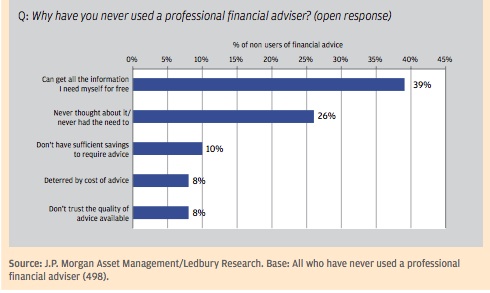
A few years ago a university in New Zealand conducted a study to find out where consumers were turning to for financial advice. At the time they found that the number one source of financial advice for most respondents was “newspapers and media”.
For 29% of the population that was their “go to” source for financial advice. The number 2 source, at about 22% of those surveyed I think, was “friends and relatives”.

For the younger generationsit was even more dramatic…friends still dominate, but the internet search is massive.
Way down at the bottom of the list was actually talking to a professional who knows something about delivering financial advice.
A report from JP Morgan in the UK suggested that this was not an aberration.
39% of the surveyed population in the UK felt that they could obtain everything they needed in the way of information from publicly available sources.

At first glance it is easy for those of us in the advice industry to murmur “fools!” because we know that journalists and amateur bloggers don’t know as much as we do, so how could such high percentages of the population rely upon those sources for financial advice?
Some of it is just ignorance of course. They don’t know what they don’t know, and just as importantly, too high a proportion of the population is ignorant of what financial advisers know and can do. That is our problem to fix of course.
But then there is also the fact is there is a significant proportion of the working population that actually have very simple needs. They don’t all require specialised knowledge or complex solutions.
There is a proportion of the population that actually doesn’t really need financial advice as such, though they will often fall into the camp of needing some financial education. If education, or financial literacy, is the requirement then it really is simply information they need to help manage relatively simple needs themselves.
That is why high street banks are able to move product over the counters. Or why consumers turn to the robo-advisers. Or why they just google financial products and then transact directly with a product manufacturer over the phone.
The consumer choices are abundantly clear:
Good advice? Cheap advice? Fast advice?
At the most they will pick two of these attributes….more often than not they will simply choose one. “Cheap will do me….” or “Just get it done as quickly as possible….”
The trend is not changing….many consumers have simple needs and will go for simple solutions. Preferably cheap and fast.
Smart advisers won’t try to compete in those spaces, or for those needs. They will focus on those parts of market where quality counts, and consumer expectations are high, and where there is complexity and confusion.
Sure, those consumers are tougher task masters and often demanding and intensive to work with. But they know what they need help with, they are willing to pay for it, and they value the advice component. THAT is where the real value is for the advice profession.
Not all consumers are good clients for advice businesses. Those who want it cheap and fast are definitely not. It is that simple.
Related: The Basics of “Looking Good” — Professionally Speaking

